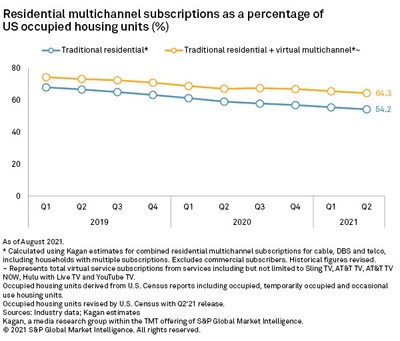Press Releases
NEW YORK, Aug. 23, 2021 /PRNewswire/ -- The quarterly variations in the pace of U.S. traditional multichannel erosion offered slight improvement in the second quarter of 2021 without fundamentally altering the longer-term trajectory, according to Kagan, a media research group within S&P Global Market Intelligence. Losses to cable, telco and satellite video services slowed from the year-ago period to 1.5 million and were accompanied by improvements to the comparisons for the first six months and trailing 12-month periods from 2020.
Kagan's latest report found that continued sluggish virtual multichannel growth hampered progress in maintaining the number of subscriptions to a package of live linear network and on-demand content represented by the combined traditional and virtual multichannel segments. The combined virtual and traditional multichannel households accounted for 64.3% of occupied households at 83.1 million residential subscriptions.
Additional takeaways from Kagan's Q2 2021 U.S. multichannel subscribers report:
- Virtual multichannel eked out a 0.7% sequential uptick in subscribers, passing 13 million customers. The segment gained 2.7 million subscribers in the 12 months ended June 30, 2021.
- Cable losses slowed sequentially. For the six-month period ended June 30, however, 2021 shows the sector's largest decline on record, topping the previous trough logged in 2020 by nearly 10%.
- Satellite multichannel logged its smallest quarterly net losses since the second quarter of 2018, but the segment remains on a seemingly inexorable downward trajectory, ending the period with an estimated 20.5 million subscribers, down 39% from its first-quarter 2014 peak.
- Telco video subs slumped to 7.3 million. Overall losses were driven by the estimated 7.5% sequential decline in AT&T U-verse subscribers, while Verizon Fios notched a more moderate 1.6% slide, a pace more in line with the cable sector.
S&P Global Market Intelligence's Kagan research team provides in-depth coverage and deep analyses of the global technology, media and telecommunications sectors (TMT). This TMT research offering complements S&P Global Market Intelligence's broad universe of research sector coverage including energy, enterprise technology, financial institutions groups, leveraged loans, and metals & mining.
S&P Global Market Intelligence's opinions, quotes, and credit-related and other analyses are statements of opinion as of the date they are expressed and not statements of fact or recommendation to purchase, hold, or sell any securities or to make any investment decisions, and do not address the suitability of any security.
About S&P Global Market Intelligence
At S&P Global Market Intelligence, we understand the importance of accurate, deep and insightful information. We integrate financial and industry data, research and news into tools that help track performance, generate alpha, identify investment ideas, perform valuations and assess credit risk. Investment professionals, government agencies, corporations and universities around the world use this essential intelligence to make business and financial decisions with conviction.
S&P Global Market Intelligence is a division of S&P Global (NYSE: SPGI), the world's foremost provider of credit ratings, benchmarks and analytics in the global capital and commodity markets, offering ESG solutions, deep data and insights on critical business factors. S&P Global has been providing essential intelligence that unlocks opportunity, fosters growth and accelerates progress for more than 160 years. For more information, visit www.spglobal.com/marketintelligence.
Media Contact
Amanda Oey
S&P Global | Market Intelligence
Tel: 212-438-1904
amanda.oey@spglobal.com
SOURCE S&P Global Market Intelligence


